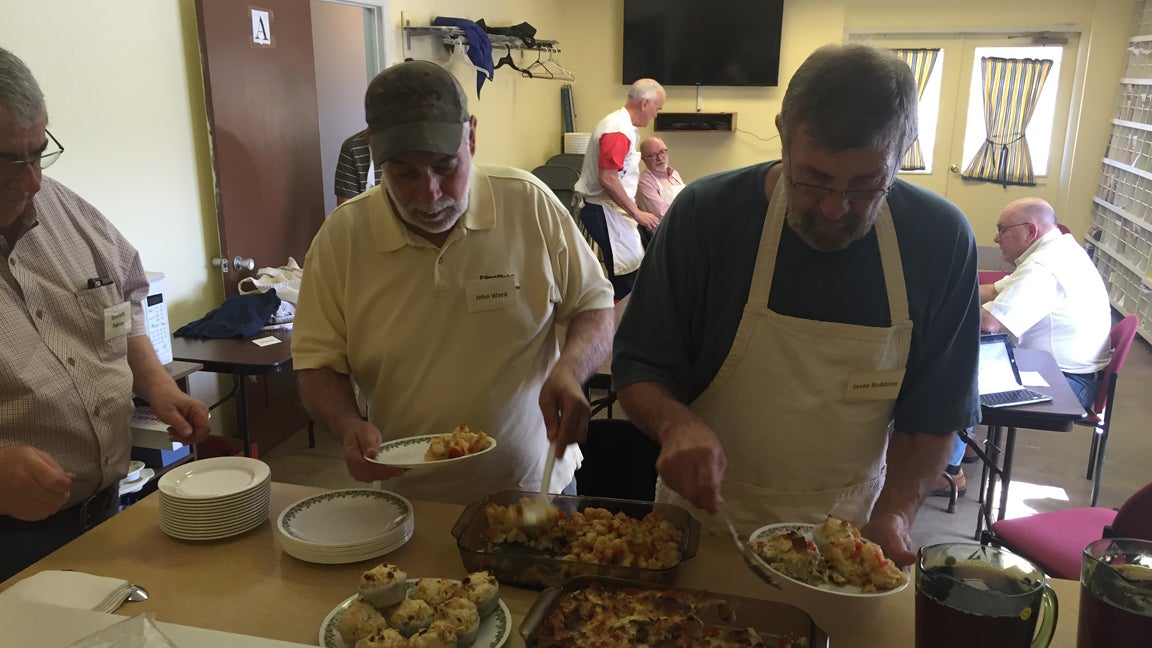Is Something Burning?
Published 10:00 pm Thursday, June 30, 2016
Men’s cooking class teaches more than a pinch of know-how
Written and Photographed by Steve Wong
We’re talking about the daily grind of breakfast, lunch, and dinner; stowing the leftovers; cleaning up the mess; and doing it all again the next day and the next, and all the days to follow. Fresh fruits and vegetables may indeed grows on trees, but someone’s got to buy them at to the grocery store – and something other than beer, chips, and Ding Dongs.
For some men, routine everyday cooking is a mystery. They can go their entire lives without ever having to cook, much less plan a meal, consider the calories and fat content, buy the ingredients, and wash the dishes. Their mommas did it for them as children; their wives did it for them as adults.
But when the women in these men’s lives are no longer able to provide meals, well, fending for themselves is a lot harder than they could have ever imagined. In many cases, they just don’t know what to do.
Trending
Since 1986, the hungry men in and around Polk County have had the opportunity to learn how to cook through an award-winning class made possible by the Polk County Cooperative Extension and the Kiwanis Club of Tryon. Simply put, it is a men’s cooking class that is never in need of students.
Once a week, for 10 weeks, 10 men meet at the extension office’s kitchen in Columbus from 9 a.m. to 1 p.m. in hopes of learning the difference between folding, stirring, and cutting batter; when to bake versus when to broil; and just why grits needs to be stirred and simmered rather than left unattended to boil at a full-tilt boogie.
On a Tuesday morning in March, just before St. Patrick’s Day, I sat in on the class with the topic being “breakfast.” I was looking forward to this class because I like breakfast foods and felt certain I’d be invited to eat what was to be prepared that day. The 10 men, ranging from middle age to senior citizen, were sitting around a makeshift table, made of smaller tables pushed together. Some wore aprons; others didn’t. Most had a cup of coffee, sitting next to their open notebooks. None of the coffee cups matched, but no one cared. The teacher was Jimmi Buell, an extension agent and educator, and she was prepping the guys for the day’s lesson.
“Breakfast is the most important meal of the day,” she said. To people who cook routinely, this was hardly breaking news, but as the class went on, it became obvious that Jimmi didn’t leave anything to chance when it came to teaching these guys the basics. “It gets your brain up and working.”
She went on to say that skipping breakfast was not a good way to lose weight. She cautioned them on letting their blood sugar level drop or eating too much sugar in their breakfast. She suggested that if they had leftovers in the fridge, they could be used in a breakfast quiche. Yes, real men to eat quiche, omelets, and smoothies.
“Actually,” she said, “eat just about anything for breakfast, as long as you eat something.”
Being the third class session, the men already had a pretty good idea of how things would go and seemed anxious to get in the kitchen, which was at the other end of the room. But Jimmi pushed on with the basics: Exploring the Dietary Guidelines for Americans, baking tips (spoon flour, not pour; and level off those measuring spoons), how to read a recipe (at least three times), baking powder versus baking soda, which was somehow made understandable by talking about unleavened bread — “Like in the Bible,” someone said. Whatever it takes.
The day’s menu would consist of Blarney Breakfast Bake, O’Larry’s Skillet Potatoes, Fruit Parfait, Irish Soda Muffins, and smoothies. They began to look over the recipes and ask questions.
“Can day-old bread be older than one day?”
“Is seeded tomatoes with or without seeds?”
“If you can’t find ground turkey, can you use chicken or beef?” which lead to an extended conversation about cross contamination and cutting boards and the in-the-news problems that Chipotle Mexican restaurants were having with food poisoning.
When Jimmi said they should not wash the chicken before cooking it, well, that just couldn’t be right, some of the men said, shaking their heads. She explained that the latest studies have shown there is more cross contamination from splashing water while washing raw chicken than from cooking it right out of the package. Some of the men who had wives said they would have to check with their better-halves before believing that one.
It was finally time to get in the kitchen. “What is the first rule of cooking?” Jimmi asked. “Wash your hands,” someone said. That’s right, and they headed to kitchen sink to do just that.
The men were divided into small groups, each charged with making one of the recipes. As they jockeyed for workspace in a kitchen way too small for 10 men, a teacher, and an interloping magazine writer, the snatches of conversations laced with a bit of salty language were a smorgasbord of wit and wonder… “let’s heat up this SOB… walnuts, where are those bad boys?… Are the dishes in the dishwasher clean or dirty? Oh, too late, they’re dirty now… cubing bread is not like building a church, get on with it… did we forget to put the cheese in the casserole that is already in the oven?… Is something burning?”
While the guys bustled about in the kitchen, Jimmi stood back and let them at it. If they had a question, she was there to answer it, but experience has taught her that practice makes… near perfect. “Men don’t follow directions as well as women,” she said. “But men don’t get upset over mistakes as much as women.” Taking it all into consideration, she noted: “You get to eat your mistakes.”
Some of the dishes were made quickly and were ready for the table; other dishes were still cooking and would be for a while. This could be a problem, and the guys looked to Jimmi. She reminded them to look at the big picture when preparing a meal and to time each dish accordingly. Heads nodded, but they decided to go ahead and eat what’s ready, namely the Fruity Breakfast Parfaits, loaded with yogurt, granola, nuts and fresh fruits and berries.
“That looks like it should be in a magazine,” someone said with a bit of pride. “It sure does,” he was answered.
The room went strangely quiet as the men ate, but men are quick eaters, and these men were ready for the hardier courses. As they ate and waited, Jimmi previewed the classes to come, such as Tofu Week.
“I think I’ll be in Charleston that weeks,” one of the guys said and got laughs all around. That led to the Joys of the Veggie Burger and a tabletop debate about the proper use of fat.
“Black bean burgers?” one of them questioned. “Oh, yeah, I’ll be in Savannah that week.” More laughs.
The debate over marinating meat with Maker’s Mark versus Crown Royal was a draw, but everyone wondered if feeding pigs beer mash would flavor the meat.
Once the rest of the food was done and served up, it got real quiet for just as long as it took the men to eat. I must say, it was pretty darn good. You can hardly go wrong with skillet-fried potatoes with onions and peppers and a casserole of sausage and bread, even if someone did forget the cheese.
SIDEBAR ——–
Eloise Johnson
The Home Ec teacher who took local men’s cooking class to national heights
When Eloise T. Johnson, 73, looks back at the Men’s Cooking Class taught by the Polk County Cooperative Extension office and partially funded by the Kiwanis Club of Tryon, she can hardly believe she was part of an award-winning program that started because local men were having a hard time feeding themselves.
It started in 1986 and was so successful that it made front-page news in The Wall Street Journal on Monday, Sept. 22, 2003, a few years after the program gained widespread use and won Extension Service state and southern regional awards in 1998 and a national award in 1999.
“It is the highlight of my Extension Service career,” she said recently while flipping through several large scrapbooks that chronicle her 30 years of service as a home economics extension agent. She retired in 2002.
Even though Eloise is the person most people associate with the Men’s Cooking Class, she is quick to point out that it was not her idea, she just took it to a higher level. The class began because local retiree and Kiwanis Club member Gene Parks, now deceased, found himself in the unfortunate situation of having to cook meals because his wife was no longer able because of arthritis that left her wheelchair bound.
Like many couples, the Parks had retired to the Tryon community, and like many couples, his wife had always done the cooking. Mr. Parks rightly believed there were probably other men in his predicament and that a cooking class just for men could be the answer to their prayers.
To make the cooking class idea come to fruition, Mr. Parks approached the Polk County Cooperative Extension about developing the concept and used his influence with the local Kiwanis club to insure funding would always be in place if needed. The idea took root. The first few years, it was taught be Extension Agent Jackie Henson and did well. It was passed onto Eloise in 1988, when she, at Mr. Parks’ urging, began to document and standardize the “packaged program.”
“It was my cup of tea,” she said. “And I did it like he wanted it done, and it worked for the Extension Service, too.” Part of the classroom strategy was to always have at least one man in the class who was fairly knowledgeable about cooking — “so it’s not just a lady there telling them what to do.” That strategy is still used today.
What Mr. Parks wanted was a textbook/cookbook and that is what Eloise gave him and all the men who came after him. Word spread about how successful the class was and soon other extension offices were using the local program and cookbook as the templates for their own classes. It spread far beyond Polk County to others in the state, the region, and eventually nationally, which lead to the news story in The Wall Street Journal.
In the beginning, the 10-week class was only $25. Today, it is $60. And if there is ever a shortage of funds to cover the cost of the food used in the class, the Kiwanis club is always standing by to fill in the financial gap. But as a good home ec teacher, Eloise she always looked for ways to cut costs by asking the men to bring in food they grew in the gardens and to use foods that were seasonally plentiful and cheap.
Eloise remembered the times when Kiwanis purchased much-needed pots, pans, and bowls. “They even bought me a mixer,” she said. Eloise is a Kiwanis member, actually the second women to be admitted locally.
“I’m just glad they (the men) are there (in the class) because I saw the need,” Eloise said. “I remember one man coming to me with tears in his eyes. His wife had died, and he didn’t even know how to use a microwave oven or the difference between liquid and solid shortening. He had no concept of these things. He didn’t even know where the dishes were.” For this special case, Eloise went to the man’s home and helped him rearrange his kitchen so he could better find the things he needed to feed himself.
“This program is needed,” Eloise asserts. On rare occasion, she still stops by the class to just see how things are going. “Especially in Tryon, since we are a retirement community. There are men struggling alone in their own homes.”







